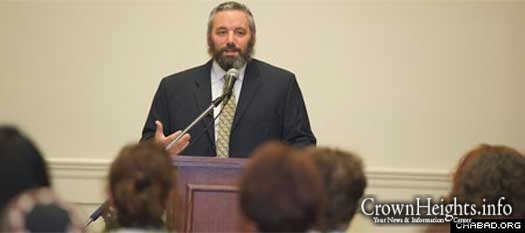
Book Offers Practical Advice from Biblical Narratives
A Canadian Rabbi delved into Biblical verses and says that from there—from the Torah’s narrative and the derivative teachings found in rabbinic commentaries—he learned the answers to life’s everyday moral questions. In order to share the practical insights he gleaned over decades of study and teaching, Chabad-Lubavitch Rabbi Lazer Gurkow, spiritual leader of Beth Tefilah synagogue in London, Ontario, Canada wrote Reaching for G-d: The Jewish Book on Self Help.
Gurkow explains in his 206-page book that the Torah has “guidance on every subject related to life, faith and observance.” But, he explains, the Torah’s many lessons are “often hidden beneath layers of understanding, each layer revealing a depth not previously discernible.”
The author gives lectures across the globe; writes a column on the weekly Torah reading; delivers lectures on Jewish.tv, the multimedia portal of Chabad.org; and serves as the Chabad-Lubavitch emissary in London. He explains that every individual has untapped potential that they can “empower and energize.” He says that a person does not need to look for strength from somewhere else. “It is already within; all we need to do is unlock it.”
Examining the story of Adam and Eve in the Garden of Eden, Gurkow writes that it seems strange that G-d created the Tree of Knowledge just to tempt them or make room for the two to sin. Couldn’t G-d have just sheltered them entirely, without providing a way for them to sin?
He explains that “the virtue of achievement [is] through struggle. G-d does not want ideal servants, naturally flawless in their devotion. He wants human creatures prone to temptation, who struggle mightily to overcome those temptations.”
It is through struggle, he writes, that one unleashes the power that lies dormant in the individual’s soul, and as a result we “uncover the depth and strength of our love and our abilities.”
When approaching the story of the splitting of the sea following the exodus from Egypt, Gurkow addresses why the sea split only after one of the leaders of the Jewish people jumped into it. This, he writes, is to teach us how a person should face his or her everyday life: “The sea demanded a demonstration of faith. G-d is not satisfied with our soul’s dormant faith, because such faith has no impact on the physical world. He challenges us to fan the flames of our ever-present but silent faith, and to express it, actualize it, through physical action.”
As with the splitting of the sea, G-d does not want us just to have faith that He will do something for us, but rather for us first to take action. When you act “with resolve, and with total disregard for the obstacles, G-d provides a way to overcome the obstacles,” just as when G-d said to jump into the sea, He did not split it at first, He waited for someone to actually jump in.
The book can be read all at once or over a period of time since it is divided into self-contained three-to-four-page essays. However one reads it, writes Gurkow: “This book will show you the way, but you need to walk the path. No one can walk it for you.”
















Big Fan
love the book!!!
A big fan
I love Lazer’s style! One of the true deep thinkers in Chabad today.
Crown Heights resident
He’s a great speaker